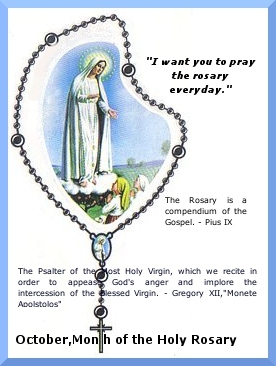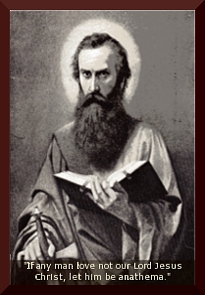 From the pen of Sr. Lucia dos Santos:
From the pen of Sr. Lucia dos Santos:
“We have seen already how God, knowing the great need we have to pray and that the opportunities and conditions of each person’s life are very different, wished nevertheless to address to everyone the same call for the daily recitation of the Rosary….”
Some Catholics considers themselves to be above “old-lady piety” when they express disdain for the rosary by saying, for instance, that they would rather read the Bible, or that they prefer another devotion instead. I once heard a priest say it. He took pride in calling himself a “Bible man”, saying that the rosary wasn’t for him. How strange that Biblical prayers and Biblical meditations had no place in the spiritual life of this “Bible man”. But we see from what Sr. Lucia wrote, that our Lady was asking EVERYONE to pray the daily rosary.
Lucia continued: “So, calling to mind the insistence with which God, by means of the Fatima Message, recommends the prayer of the Rosary, and also all that the Church’s Magisterium has said about it over the years, we can conclude that the Rosary is the form of vocal prayer which, in general, best suits all of us, and for which we should have the highest regard…
“Unfortunately, in these times of “disorientation”, there is no shortage of people who venture to criticize the Rosary, saying, for example, that it is not a liturgical prayer.
“…..Contrary to what this person, and others of the same mind, have written, I assure you that the Rosary is a biblical prayer and that it is part of the sacred Liturgy.”
Sr. Lucia then cites several examples of how the rosary is liturgical, one example being the “Gloria Patri” whereby one praises God after each decade, the same as is done at the end of the psalms in the Liturgy of the Hours. The prayers of the Rosary come from the inspiration of the Holy Ghost. She adds: “In short, the Ave Maria is a biblical prayer. It is also part of the Liturgy, being recited on various feasts of the year, both in the Mass and in the Liturgy of the Hours.”
“Returning, now, to the biblical and liturgical dimension of the Rosary, let us consider the prayer which the Message taught us to pray at the end of each decade. A similar request occurs in the Mass since the liturgical rubrics order us to begin the Holy Sacrifice by confessing our own sins, and the prayer taught us by Our Lady has us ask pardon for these same sins; ‘Oh, my Jesus, forgive us our sins, save us from the fires of hell…’
“…With this prayer [Oh my Jesus, forgive..], we ask God to apply to us the fruit of the Holy Sacrifice of the Mass, that is, the salvation of souls, together with forgiveness for our own sins.”
“In the final analysis, I believe that, after the liturgical prayer of the Holy Sacrifice of the Mass, the prayer of the Holy Rosary…because of its origin and the sublime nature of the prayers which compose it and also on account of the mysteries of our Redemption which we recall and contemplate in each decade, is the most pleasing prayer we can offer to God, and the one most beneficial to our own souls. If this were not so, Our Lady would not have recommended it to us with such insistence.”
To a nephew she once wrote: “[The Rosary] is the prayer that Our Lady recommended the most, as though to put us on our guard, in anticipation of these days of diabolical onslaught…”
Are you praying your daily Rosary?



